 February’s article was missed because we went to soak up some winter sun in Sri Lanka – sadly, the weather didn’t cooperate and we were caught up in the floods. Torrential rain, landslides and roads washed away…but still its a beautiful country, with lovely people, amazing flora and fauna, and excellent rice and curry!
February’s article was missed because we went to soak up some winter sun in Sri Lanka – sadly, the weather didn’t cooperate and we were caught up in the floods. Torrential rain, landslides and roads washed away…but still its a beautiful country, with lovely people, amazing flora and fauna, and excellent rice and curry!
Anyway, we have dried out now and are delighted to be home enjoying our beautiful Spring weather. We’ve made a few changes here over the winter – moving the mature beech hedge to give more space for the vegetable garden and installing a big new greenhouse (more details another day!) 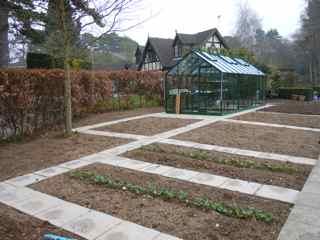
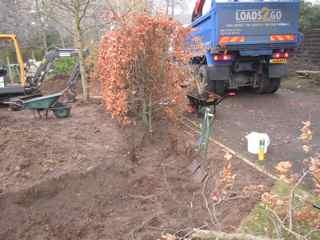 The hedge was picked up with a digger and moved a couple of meters to a new trench well dug out and enriched with compost. There was plenty of rain in January and February but the last couple of weeks have been quite dry so I will water the hedge this weekend than apply a thick mulch to suppress weeds and retain moisture during the summer. It will need a leaky hose to run along its length for ease of regular watering too…just in case we have a good summer!
The hedge was picked up with a digger and moved a couple of meters to a new trench well dug out and enriched with compost. There was plenty of rain in January and February but the last couple of weeks have been quite dry so I will water the hedge this weekend than apply a thick mulch to suppress weeds and retain moisture during the summer. It will need a leaky hose to run along its length for ease of regular watering too…just in case we have a good summer!
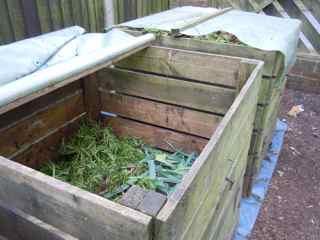 Some of you may have a compost bin in the garden and now is the perfect time to turn it out and see what you have. There should be some lovely black compost at the bottom to spread around your borders or dig into the veg patch. I have a few compost bins dotted around the garden - some are slatted timber, some are plastic from the RBWM special offer last year. I find the plastic ones are the most effective because the slatted ones tend to dry out and then the composting process stops.
Some of you may have a compost bin in the garden and now is the perfect time to turn it out and see what you have. There should be some lovely black compost at the bottom to spread around your borders or dig into the veg patch. I have a few compost bins dotted around the garden - some are slatted timber, some are plastic from the RBWM special offer last year. I find the plastic ones are the most effective because the slatted ones tend to dry out and then the composting process stops.
Composting is a natural process where nitrogen rich (eg soft green plant material, grass cuttings, kitchen veg waste) and carbon rich ( shredded cardboard, straw, stalks) material is broken down by microrganisms and aerobic bacteria. There are numerous articles on how to make the best heap but the key elements are to have the correct balance of finely chopped nitrogen and carbon-rich material, keep the moisture level up, turn the heap once a month (optimistic at this house!) to allow air into the pile and put 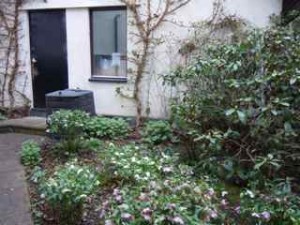 the drier material from the side to the centre.
the drier material from the side to the centre.
http://apps.rhs.org.uk/advicesearch/Profile.aspx?pid=444
http://www.bbc.co.uk/gardening/basics/techniques/soil_makecompost1.shtml
If you don’t have the room or the inclination to compost yourself you can buy a green bin from RBWM which is collected once a fortnight and composted off site.
I visited Shorts green waste composting facility in Winkfield earlier this week to see how the experts do it!
Shorts take and process 10,000T /year of green waste on contract from local councils and landscape contractors, tree surgeons etc. 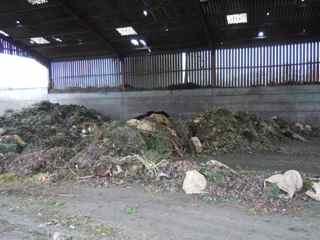 It is spread in the receiving bay for visual inspection and removal of plastic, rocks, pots etc – including the odd football!
It is spread in the receiving bay for visual inspection and removal of plastic, rocks, pots etc – including the odd football!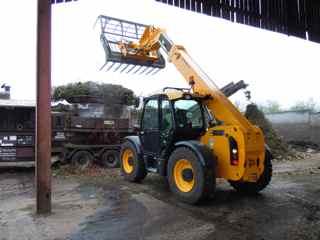 It is then lifted and loaded into the shredder to be cut into material with a nominal size of 20mm.
It is then lifted and loaded into the shredder to be cut into material with a nominal size of 20mm.
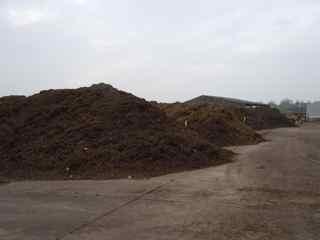
Windrows (big piles of shredded material in the open air) are formed in the yard 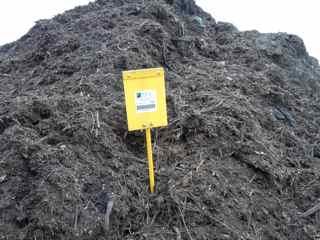 containing about 150T of material each and as each windrow is completed it is allocated a unique identifying number. Over the next couple of months the windrows are turned by loading shovel until stable and sanitised, then screened to produce 20mm mulch or 10mm soil improver for sale to the agricultural and horticultural industries.
containing about 150T of material each and as each windrow is completed it is allocated a unique identifying number. Over the next couple of months the windrows are turned by loading shovel until stable and sanitised, then screened to produce 20mm mulch or 10mm soil improver for sale to the agricultural and horticultural industries.
 Shorts use a state of the art Compost Manager computer system which monitors the essential parameters of the windrows – oxygen, carbon dioxide, moisture and temperature, measured by inserting a probe into the pile at several positions. The system calculates what is required to maximise the efficiency of the composting process and produces daily work sheets eg turn windrow 51, water windrow 53.
Shorts use a state of the art Compost Manager computer system which monitors the essential parameters of the windrows – oxygen, carbon dioxide, moisture and temperature, measured by inserting a probe into the pile at several positions. The system calculates what is required to maximise the efficiency of the composting process and produces daily work sheets eg turn windrow 51, water windrow 53.
The material becomes ‘sanitised’ after achieving 65deg C for 7 days and is then turned a further 4 times until it reaches stabilisation and the temperature drops.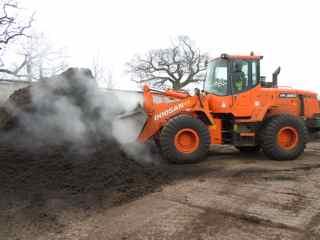
This system was adopted after a very successful trial period which resulted in a more stable product, fewer turns thus saving fuel and manhours, minimal odour release, better quality control and a fully traceable record system. Shorts produce material meeting the PASS100 industry standard, with various criterion for weed and sharps content, germination tests etc and are rightly proud of their 15year experience in green waste composting.
Their main customers are the local cereal farms, landscapers and the polo field but they will also supply the 10mm soil improver or 20mm mulch to domestic customers. They can deliver a 1000litre big bag, a 6 or 8 yard skip or up to a 15T lorry load.
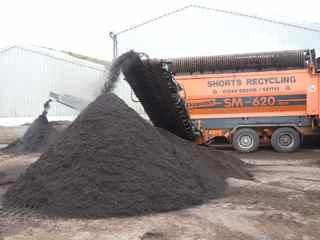
I have ordered an 8yard skip of 10mm product for delivery tomorrow – so that’s my job for the weekend – finger crossed for sunshine!
To see this month's gardening feature - CLICK HERE
